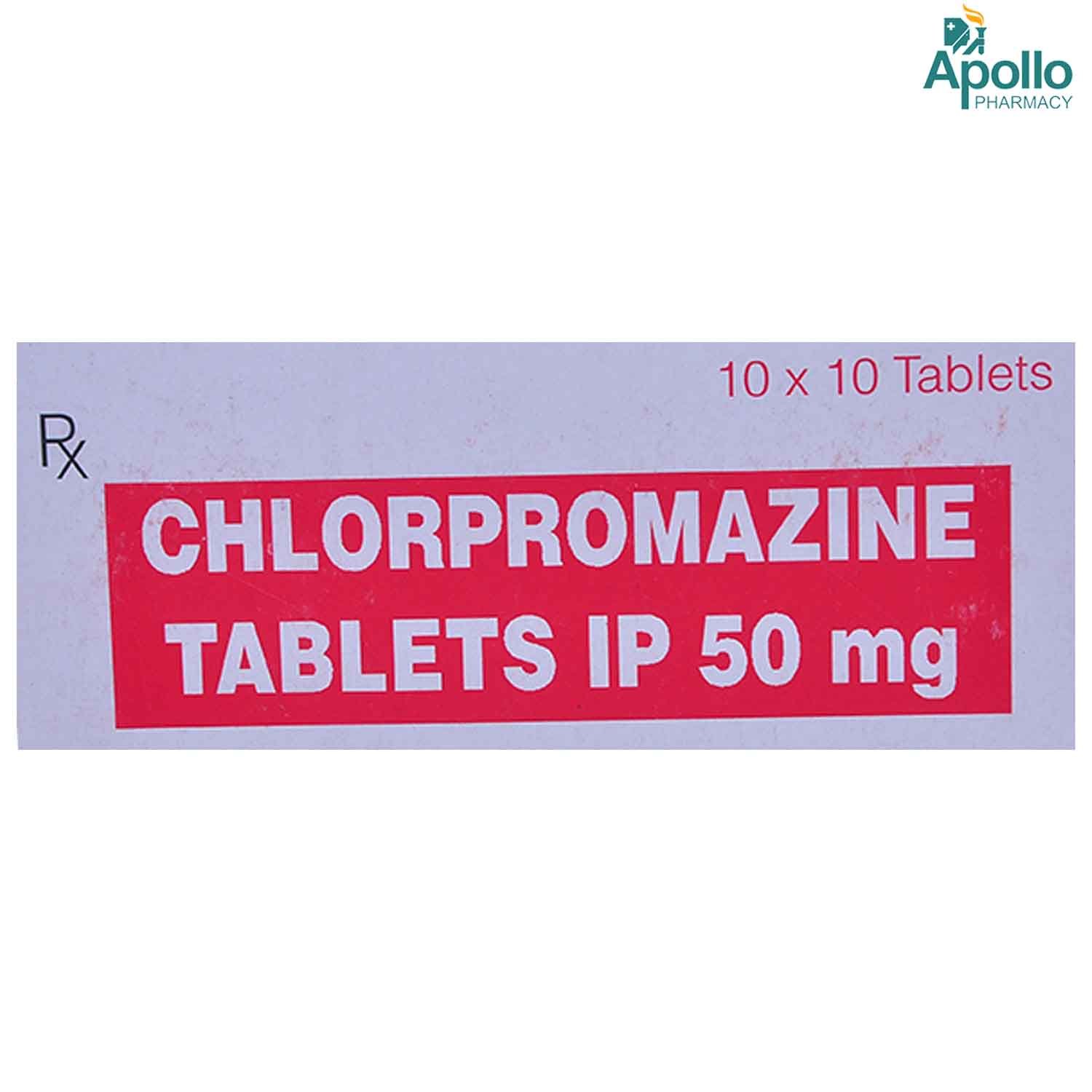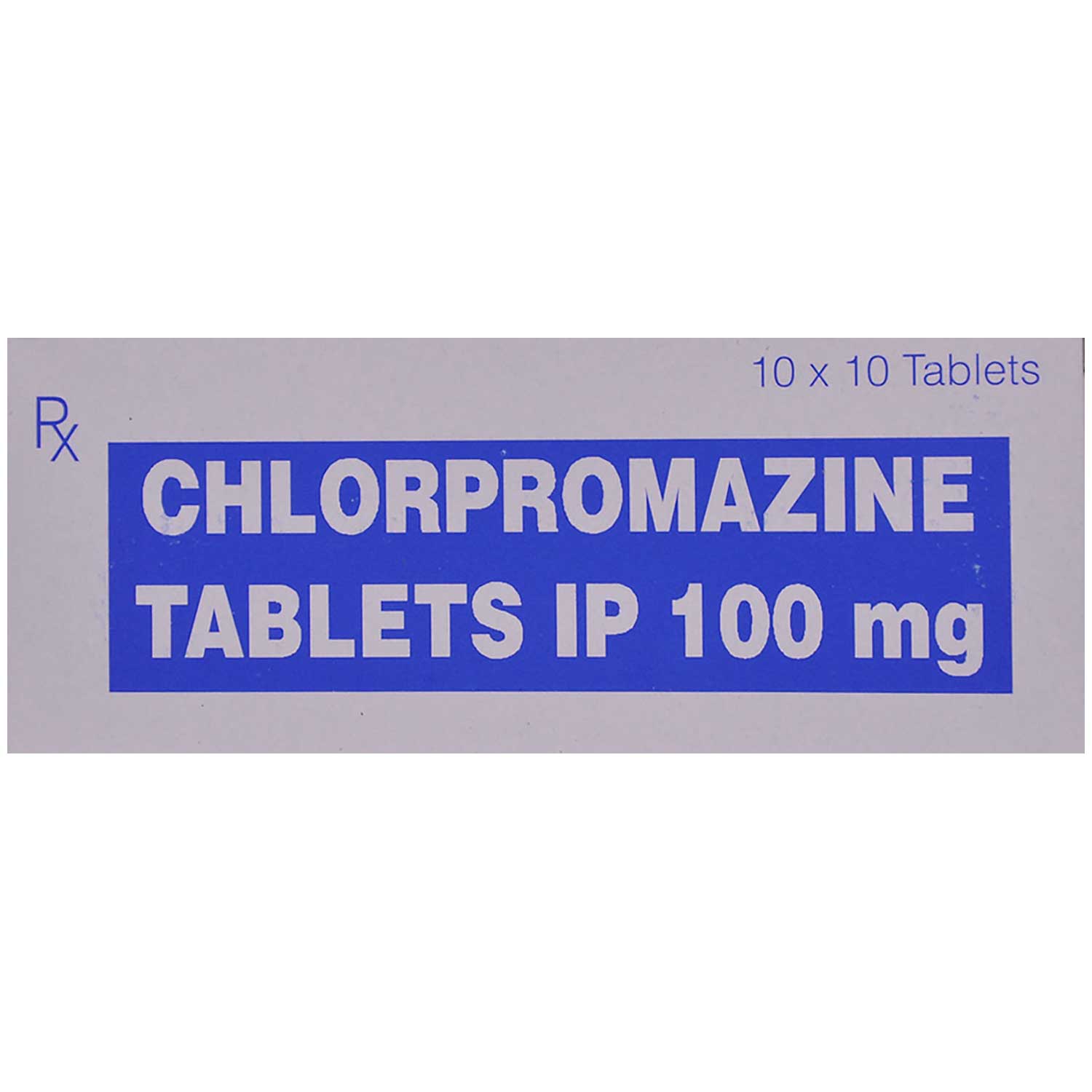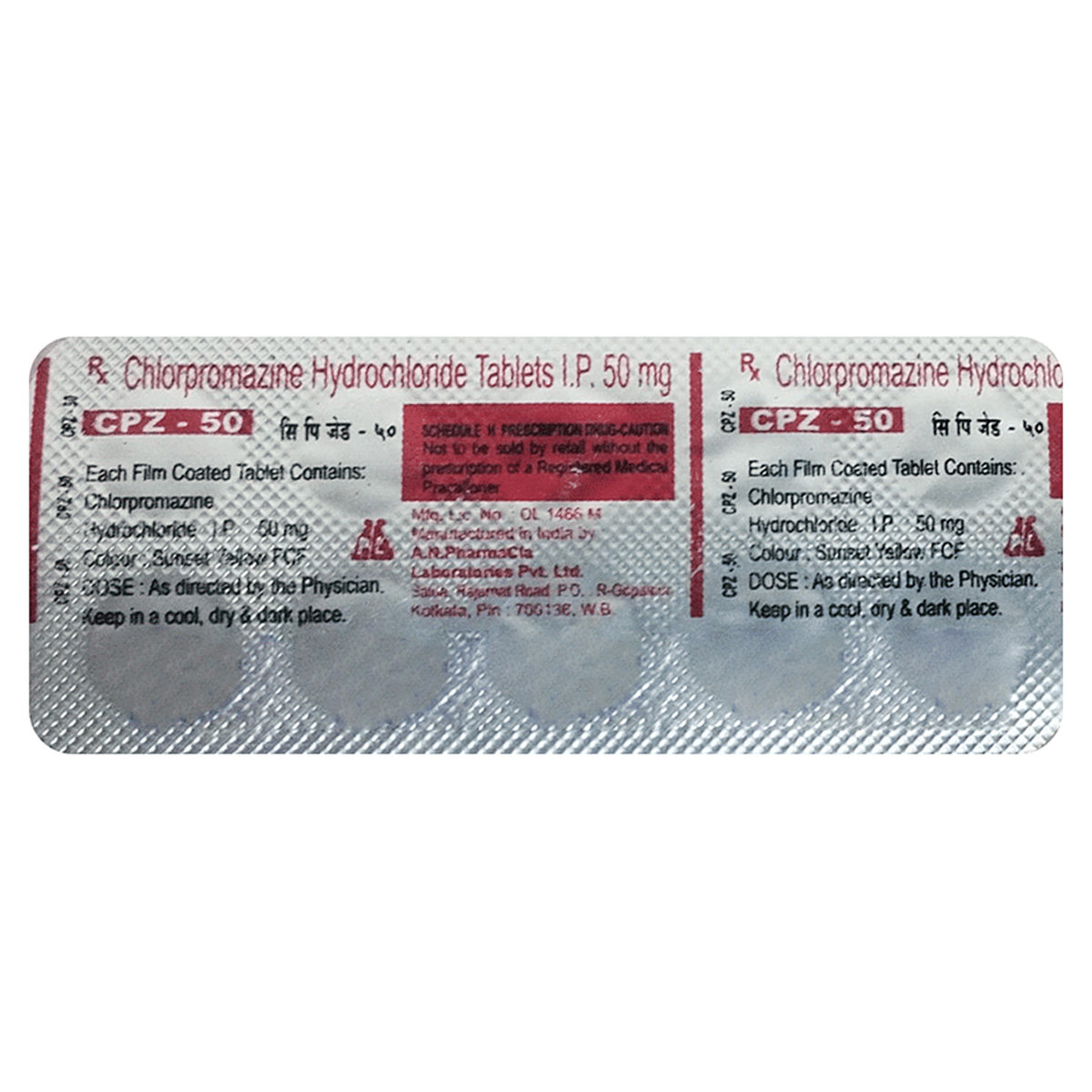Chlorpromazine
About Chlorpromazine
Chlorpromazine is used in the treatment of schizophrenia or psychosis and bipolar disorder (manic depression). Besides this, it is also used to treat nausea and vomiting, anxiety before surgery, and chronic hiccups (involuntary spasms of the diaphragm). Schizophrenia is characterised by hallucination symptoms (seeing or hearing things that are not real) and delusions (wrong beliefs). Manic episodes of excitement or depression characterise bipolar disorder. Chlorpromazine prevents the occurrence of these symptoms.
Chlorpromazine contains ‘Chlorpromazine’, which is an antipsychotic drug. It acts by blocking dopamine, a neurotransmitter present in the brain responsible for developing schizophrenia and bipolar disorder symptoms. Chlorpromazine rebalances dopamine to improve thinking, mood, and behaviour. It also blocks the other natural substances receptors in the brain, such as histamine and muscarinic receptors, thereby preventing nausea and vomiting.
Take Chlorpromazine as prescribed by your doctor. You are advised to take Chlorpromazine as prescribed by your doctor, depending on your medical condition. In some cases, you may experience certain common side effects, such as sleepiness, orthostatic hypotension (sudden lowering of blood pressure upon standing), dry mouth, abnormality of voluntary movements, weight gain, urinary retention, constipation, muscle stiffness, and tremors. Most of these side effects of Chlorpromazine do not require medical attention and typically resolve on their own over time. However, if these side effects persist longer, please consult your doctor.
Do not take Chlorpromazine if you are allergic to Chlorpromazine or any other ingredients present in it. Before taking Chlorpromazine, talk to your doctor if you or your family have a history of blood clots, stroke, or heart disease, or if you are above 65 years and have a history of dementia (memory loss). Chlorpromazine is not recommended during pregnancy as it may affect the unborn baby. Tell your doctor if you are breastfeeding before taking Chlorpromazine. It is not recommended for use in children under 1 year of age. Please do not stop taking Chlorpromazine without your doctor’s advice, as it may lead to withdrawal symptoms.
Uses of Chlorpromazine
• Psychotic Disorders: Chlorpromazine is used to treat acute and chronic psychoses, including schizophrenia, paranoia (feelings of distrust and suspicion), and mania or hypomania in bipolar disorder (manic depression). It helps reduce symptoms such as increased energy, decreased need for sleep, and hyperexcitability.
• Behavioural disturbances: Chlorpromazine is used in the short-term management of agitation and anxiety. It also helps calm down aggressive or impulsive behaviour.
• Chronic (Intractable) Hiccups: Chlorpromazine may be prescribed for the relief of persistent or severe hiccups that last more than 48 hours.
• Nausea and Vomiting: Chlorpromazine is effective in controlling nausea (feeling sick) or vomiting (being sick), especially in terminal illness when other medications have failed.
• Pre-operative Anxiety: Chlorpromazine helps relieve restlessness and nervousness before surgery.
• Acute Intermittent Porphyria (AIP): Chlorpromazine helps manage symptoms associated with AIP, such as abdominal pain, anxiety, and mood changes.
• Tetanus: Chlorpromazine is used in conjunction with other medications to manage the symptoms of tetanus, including spasms and muscle rigidity.
• Hypothermia Induction: In rare cases, Chlorpromazine is used to lower body temperature during specific medical or surgical procedures intentionally.
• Use in Paediatric Patients: Chlorpromazine is used under strict medical supervision to treat schizophrenia, autism (difficulties in learning and social communication), and attention-deficit hyperactivity disorder (a condition marked by hyperactivity, inattention, and impulsivity) in children.
• Other (Off-Label) uses: Chlorpromazine is sometimes used to reduce vomiting and nausea associated with migraine attacks and in end-of-life care to manage nausea and improve comfort.
Medicinal Benefits
Chlorpromazine works by helping to restore the balance of certain natural substances in the brain. The key action of Chlorpromazine is to block the dopamine receptors (D2) in the brain and correct dopamine's overactivity. Altogether, Chlorpromazine may help decrease hallucinations and help you think more clearly and positively about yourself, feel less agitated, and take a more active part in everyday life. On the other hand, it also blocks histamine H1 and muscarinic M1 receptors in the vomiting centre, thereby preventing nausea and vomiting.
Directions for Use
- Chlorpromazine can be taken with or without food, as advised by your doctor.
- Your doctor will determine the dosage and timing of this medication based on your medical condition.
- Swallow Chlorpromazine as a whole with a glass of water.
- Do not crush, chew, break, or open it.
Storage
Side Effects of Chlorpromazine
- Sleepiness
- Orthostatic hypotension (sudden lowering of blood pressure on standing)
- Dry mouth
- Weight gain
- Urinary retention
- Constipation
- Muscle stiffness
- Tremor
Medicines Containing this Salt
View AllDrug Warnings
Do not take Chlorpromazine if you are allergic (hypersensitive) to any ingredients present in it. Please consult your doctor before taking Chlorpromazine if you are pregnant, planning to conceive, or breastfeeding. The use of Chlorpromazine should be avoided in children and adolescents whose signs and symptoms suggest Reye’s syndrome (confusion, swelling in the brain, and liver damage). Elderly patients (above 65 years) with dementia-related psychosis (memory loss) treated with antipsychotic drugs increased the risk of death. Do not abruptly stop taking the medication, as it may cause withdrawal symptoms, especially suicidal thoughts in young adults. Before taking Chlorpromazine, talk to your doctor if you have a history of blood clots, alcohol or drug abuse, fits (seizures), Parkinson's disease, hypothyroidism (reduced activity of the thyroid gland), stroke or heart diseases, myasthenia gravis (a condition where muscles become easily tired and weak leading to difficulty breathing) and glaucoma (increased pressure in the eye).
Drug Interactions
Drug-drug interactions: Chlorpromazine may interact with antidepressants (citalopram, escitalopram, bupropion), medicines for Parkinson’s disease (levodopa), antiepileptic ( carbamazepine, phenobarbital), medicines control heartbeat (amiodarone, disopyramide, quinidine), medicines used to calm emotion and mental disorder (olanzapine, prochlorperazine) antihypertensive (clonidine, guanethidine, propranolol), antibiotic (moxifloxacin) and medication used to treat mental illness (lithium).
Drug-food interactions: Chlorpromazine may interact with grapefruit and alcohol and increase the risk of side effects.
Drug-disease interactions: Chlorpromazine should be used with caution in patients with heart problems such as QT prolongation (heart rhythm problem), acute alcohol abuse, central nervous system (CNS), depression, dementia, stroke, seizures, diabetes, and liver problems.
Drug-Drug Interactions Checker List:
Safety Advice

Alcohol
unsafeAlcohol may worsen the condition and increase the risk of side effects while using Chlorpromazine.

Pregnancy
cautionChlorpromazine is a category C pregnancy drug. It may affect the unborn baby. Please consult your doctor before taking Chlorpromazine if you are pregnant or planning to conceive.

Breast Feeding
cautionChlorpromazine is known to be passed through breast milk. So, it is recommended not to take Chlorpromazine during breastfeeding. However, your doctor may prescribe it for you during breastfeeding if the benefits outweigh the risks.

Driving
unsafeChlorpromazine may cause drowsiness, dizziness, and light-headedness. If you are affected, do not drive or operate machinery after taking Chlorpromazine.

Liver
consult your doctorChlorpromazine should be used with caution in patients with liver diseases. Dose adjustment may be necessary.

Kidney
consult your doctorChlorpromazine should be used with caution in patients with kidney diseases. Dose adjustment may be necessary.

Children
cautionChlorpromazine is not recommended for children below 1 year of age. However, please consult a doctor before giving Chlorpromazine to children.
Habit Forming
Diet & Lifestyle Advise
- Monitor your mood. Regularly track your mood, including factors such as sleep, medication, and activities that can affect it.
- Exercise daily to avoid the weight gain that can be a side effect of bipolar medication.
- Practice calming techniques such as meditation and deep breathing exercises.
- Get enough sleep to help stabilise your mood.
- Eat a healthy diet. Certain foods may have a greater impact on your mood than others. Consider keeping a food log to track what you eat and how specific foods affect your well-being. Consult with your doctor or a nutritionist about foods that may help stabilise your mood.
- Stay optimistic. It will take time for your symptoms to improve after you start bipolar therapy, but you will feel relaxed knowing that you will get better and that the worst is most definitely behind you.
- Eating a healthy diet that includes plenty of fruits and vegetables, lean meats, skinless poultry, nuts, fish, whole grains, plant-based oils, and low-fat dairy products can help maintain good health and reduce the risk of nausea and vomiting.
- One should avoid taking greasy or oily foods, as this food triggers nausea and vomiting.
- Eat cool foods instead of hot and spicy foods.
- Include clear broths, non-fat yoghurt, fruit juice, sherbet, and sports drinks to replenish the fluid that has been lost due to vomiting.
Special Advise
- Geriatric patients with dementia-related psychosis treated with Chlorpromazine are at an increased risk of death. Please consult your doctor before taking Chlorpromazine.
- Your doctor may advise you to regularly check your blood glucose levels, as Chlorpromazine can affect the levels of sugar in your blood.
Patients Concern
Disease/Condition Glossary
Schizophrenia (psychosis): It is a mental illness in which brain information processing is affected. Patients with schizophrenia develop symptoms such as hallucinations (seeing or hearing unreal things), delusions (false beliefs), and withdrawal from society. They lose the ability to differentiate reality from false beliefs. Schizophrenia and bipolar disorder may occur due to genetic factors, alcohol or drug abuse, or mental trauma. Schizophrenia may also occur due to brain injuries or diseases.
Bipolar disorder: Patients with bipolar disorder have mood swings ranging from manic episodes of heightened excitement to severe depression. It may occur due to genetic factors, alcohol or drug abuse, and mental trauma.
FAQs
Chlorpromazine is used in the treatment of schizophrenia or psychosis and bipolar disorder (manic depression). Besides this, it may also be used to treat nausea and vomiting, anxiety before surgery, and chronic hiccups (involuntary spasms of the diaphragm).
Chlorpromazine works by blocking dopamine receptors in the brain. By inhibiting the synthesis of the dopamine hormone, there will be a decrease in the occurrence of symptoms in patients with schizophrenia and bipolar depression.
You are not recommended to stop taking Chlorpromazine without consulting your doctor. It may cause withdrawal symptoms such as palpitations (the sensation that the heart skipped a beat or an extra beat), anxiety, confusion, difficulty sleeping and tremors. Therefore, take Chlorpromazine for as long as your doctor has prescribed it. If you experience any difficulty while taking Chlorpromazine, please consult your doctor so that the dose can be gradually reduced.
Chlorpromazine is not recommended for patients suffering from myasthenia gravis (severe muscle weakness) as it may worsen the condition. Therefore, inform your doctor if you have myasthenia gravis before taking Chlorpromazine.
Long-term use of Chlorpromazine may cause dyskinesia (a movement disorder) in some cases. However, your doctor will prescribe this medication if the benefits outweigh the risks.
Chlorpromazine can decrease anxiety, irritability or agitation. However, you should consult a doctor before using Chlorpromazine.
No, Chlorpromazine is not a benzodiazepine or a sleeping tablet. It belongs to the class of medications called antipsychotics. However, consult your doctor if you have any concerns.
No, Chlorpromazine is not a controlled substance/ narcotic. However, a doctor's prescription is required to purchase it.
No, Chlorpromazine does not have a high potential for addiction. However, take Chlorpromazine as prescribed by your doctor.
You are recommended to take the advice of your doctor because it is not the primary treatment for opiate withdrawal.
The common side effects of Chlorpromazine are sleepiness, orthostatic hypotension (low blood pressure), dry mouth, abnormal voluntary movements, weight gain, urinary retention, constipation, muscle stiffness, and tremors. Most of these side effects of Chlorpromazine do not require medical attention and typically resolve on their own over time. However, if these side effects persist longer, please consult your doctor.







